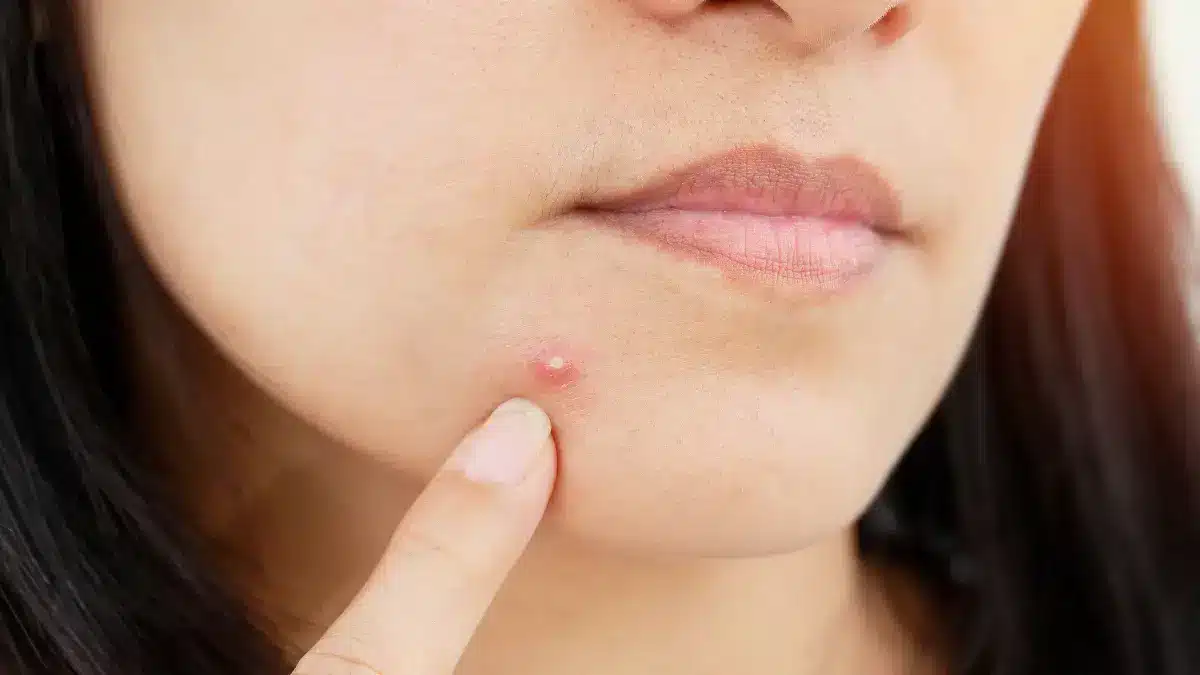Menopause Acne: Understanding and Overcoming the Breakouts
Menopause is a natural stage in a woman’s life.
It signifies the end of her reproductive years.
Apart from mood swings and hot flashes, women usually face acne breakouts.
Hormonal fluctuations during Menopause and an increase in Androgen hormones stimulate oil production and clog pores, leading to acne.
By comprehending these underlying factors, you can adopt targeted strategies to address Menopause acne and regain clear, healthy skin.
Understanding Menopause-related acne
Menopause triggers changes in the woman’s body, including hormonal shifts affecting the skin.
Factors like hormones, aging, lifestyle, and genetics contribute to Menopause-related acne.
Hormones
During Menopause, declining Estrogen and increasing Androgen hormones prompt excess oil production.
As a result, it clogs pores and causes acne.
Aging
The biological process of aging renders skin thinner and less resilient.
As a result, it amplifies susceptibility to breakouts.
Lifestyle choices

Lifestyle choices exert influence too.
Stress, poor dietary habits that include processed foods, and inadequate sleep disrupt hormones and provoke acne flare-ups.
Genetics
Genetic factors play a significant role in determining an individual’s acne vulnerability during Menopause.
If any female family member has faced acne breakouts during Menopause, you might also be at risk.
Understanding the impact of these factors on the skin and acne development empowers the formulation of effective strategies.
Menopause-related acne can be managed with hormonal balance, healthy lifestyles, and proper skincare.
How Menopause acne is different
Compared to regular acne, Menopause-related acne displays distinctive characteristics.
It primarily affects the lower face and neck, particularly the chin and jawline.
Notably, cystic acne, which is deeper and more painful than surface-level pimples, often accompanies Menopause acne.
Treating this acne can be more challenging than other types.
The hormonal fluctuations during Menopause contribute to persistent breakouts, making it an ongoing issue.
The deep-rooted nature of cystic acne adds complexity to treatment.
As a result, it requires targeted approaches to address underlying inflammation.
Seeking guidance from a healthcare professional becomes crucial.
Dermatological interventions and prescription medications may be necessary for effective management.
Understanding the unique features of Menopause-related acne can help combat breakouts and achieve clear, healthy skin.
Treatments
Effectively managing acne during Menopause often requires medical interventions provided by dermatologists.
They can recommend different treatments customized to suit individual needs, including topical and oral medications.
Topical medications

Dermatologists may prescribe creams or gels containing ingredients like retinoids, benzoyl peroxide, or antibiotics.
These medications help unclog pores, reduce inflammation, and prevent bacterial growth that causes acne.
Oral medications
In some instances, dermatologists may suggest oral medications such as antibiotics, hormonal therapies (like birth control pills), or Isotretinoin.
These treatments target bacteria, hormonal imbalances, and excessive oil production, addressing the root causes of acne.
Collaborating with a dermatologist is vital for developing an effective treatment plan.
Buy Yasmin 3 mg now to regain clear and healthy skin. Click now to uncover the benefits.
Dietary changes
Doctors recommend opting for a balanced diet.
Your diet must contain whole grains, lean proteins, fruits, and vegetables.
Plus, avoid intake of processed beverages and sugary snacks, as they can potentially worsen acne breakouts.
Regular exercise
You can balance your hormonal levels and promote healthy blood circulation by exercising regularly.
Aim for at least thirty minutes of moderate exercise.
You can include brisk walking, cycling, or yoga on most days of the week.
Stress reduction techniques
Chronic stress can aggravate acne breakouts.
Practice stress reduction techniques like deep breathing exercises and meditation.
You can also engage in hobbies that promote relaxation and mental well-being.
Adequate sleep
Learn to prioritize your sleep.
Quality sleep plays a crucial role in hormone regulation and overall health.
Aim for seven-eight hours of uninterrupted sleep each night.
Natural skincare products

Always choose natural skincare products that are gentle, non-comedogenic, and free of harsh chemicals.
Look for ingredients like tea tree oil, witch hazel, or salicylic acid, known for their acne-fighting properties.
To incorporate these remedies into a Menopause management plan, make small, sustainable changes.
Gradually adopt healthier eating habits that resonate with you.
It’s essential to consult with a healthcare professional or dermatologist for personalized guidance.
They will help ensure these natural remedies align with your needs and health profile.
Conclusion
Menopause-related acne can be effectively managed by understanding its causes and adopting appropriate strategies.
Hormonal fluctuations, aging, lifestyle factors, and genetics contribute to breakouts.
Lifestyle modifications like dietary changes and skin care choices can significantly manage acne during Menopause.
Additionally, medical treatments, including topical and oral medications prescribed by dermatologists, offer targeted solutions.
By combining these approaches, you can regain clear and healthy skin.
Frequently Asked Questions
How do you get rid of Menopausal acne?
To get rid of Menopausal acne, adopt a skincare routine with gentle cleansers and non-comedogenic products. Consult a dermatologist for personalized treatment options and consider hormonal therapies or topical medications.
What does Menopause acne look like?
Menopause acne manifests as blemishes, such as pimples, blackheads, and whiteheads, typically concentrated around the chin and jawline. It may also involve cystic acne, which is more profound and more uncomfortable compared to superficial breakouts.
How long does Menopause acne last?
The duration of Menopause acne differs for each person. Typically, it lasts for several years throughout the Menopause transition but eventually diminishes as hormone levels stabilize. Seek guidance from a dermatologist for personalized information and advice.
Why am I getting acne in Menopause?
The occurrence of acne during Menopause can be attributed to hormonal changes, specifically the decline in Estrogen and an increase in Androgen levels. These fluctuations stimulate excess oil production, resulting in clogged pores and breakouts. Seeking guidance from a dermatologist can offer valuable insights and treatment possibilities.
WowRx uses only high-quality sources while writing our articles. Please read our content information policy to know more about how we keep our content reliable and trustworthy.






